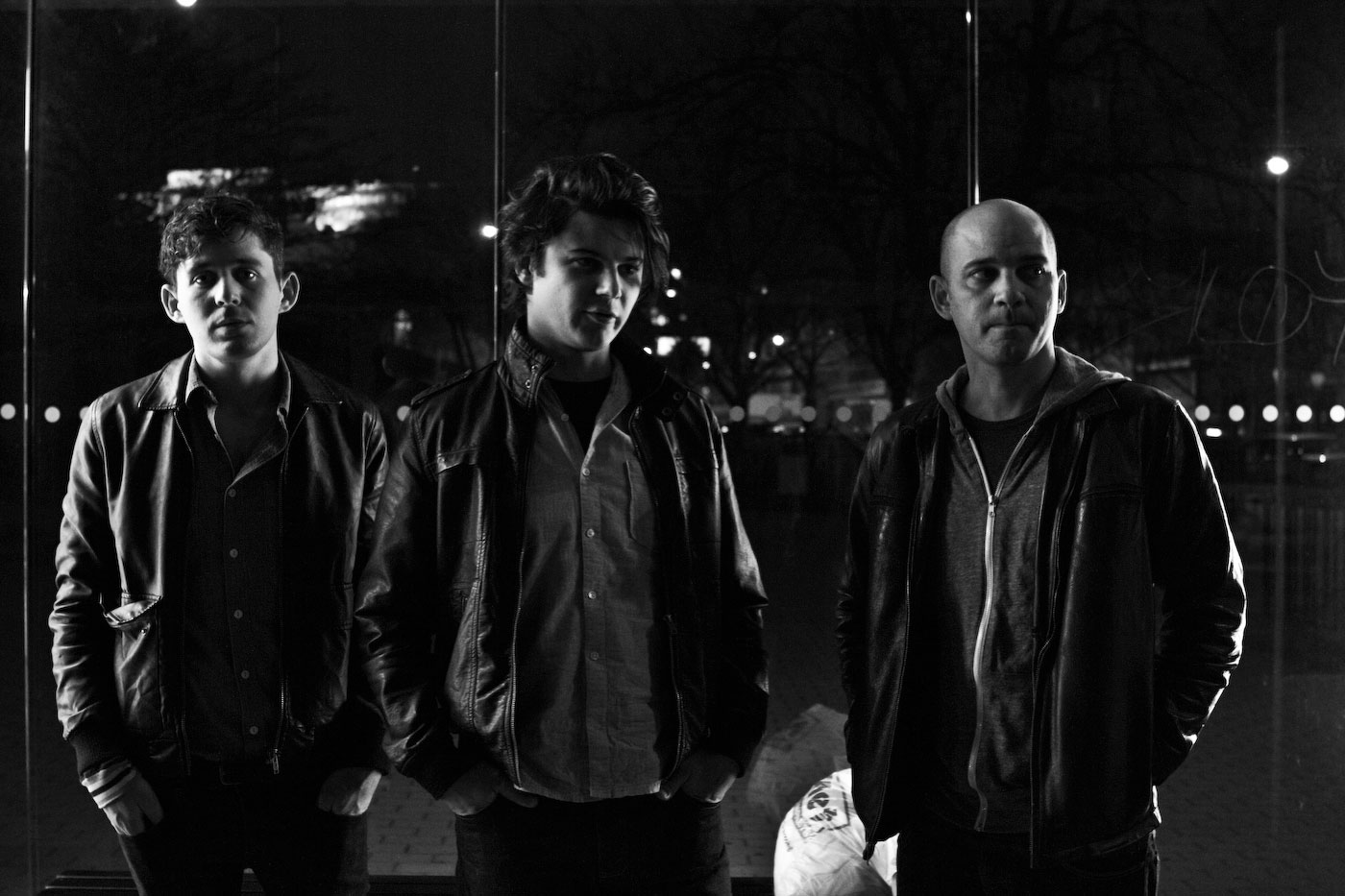How The Antlers Keep Growing

THE ANTLERS. PHOTOS BY MATT CREED
The Antlers’ frontman, Peter Silberman, was just 22 when he first self-released his breakout album, Hospice—a grand, sweeping concept piece about love, death, and abuse, which Silberman wrote alone in his apartment—and it made serious waves in the indie-rock community. (Pitchfork called the music “a delicately branching instrument of force.”) Suddenly, Silberman—along with the two musicians he’d brought on to play with him, Darby Cicci and Michael Lerner—found himself in a strange position: young, in the first blush of his musical career, but already defined by a single, very strong project.
After a few years of touring, The Antlers are back this spring with Burst Apart, which diverges from Hospice in all the ways you’d hope it would. It’s not a concept album, for one; and those who’d pigeonholed The Antlers as a melancholic band will be pleasantly surprised to find that most of the songs boast quite a bit of pep. Though Silberman, who still writes all the lyrics, is obviously concerned with some of the same topics (“Prove to me that I’m not going to die alone,” he croons on the album’s closer, “Putting the Dog to Sleep”), Burst Apart finds Silberman and his bandmates doing some welcome experimentation: with electronic mixing and jazz, organs and Andrew Bird-style plucked strings (“Every Night My Teeth Are Falling Out”). And those who’ve heard the album’s first single, “Parentheses,” have already discovered that when the mood is right, The Antlers can actually sound sexy. We chatted with Silberman a few weeks ago, when he was gearing up for Burst Apart to drop.
ALEXANDRIA SYMONDS: I love your new album. It’s such a departure from Hospice. It was so weird the first time I heard “French Exit,” because I don’t think of The Antlers as a band that makes party music.
PETER SILBERMAN: Yeah. [laughs] Yeah, we definitely were looking to go a different direction with this, without completely changing who we are as a band.
SYMONDS: And the rest of your band was more involved in the songwriting this time around, right?
SILBERMAN: Yeah, definitely. Hospice I really wrote by myself, and had the band members come in and play parts that they were writing. But this was us writing these songs together, in our own studio. Really letting things develop naturally, and turn into whatever they were going to turn into. I don’t think we really had a preconceived idea of what this was going to be when we started.
SYMONDS: Did you feel like you had a lot of time to figure it out?
SILBERMAN: We did. What was weird was, we were on tour for a really long time. And then it was hard to set aside enough time in between to actually get it done. We were trying to do that for about a year. We were trying to make the time to make the record, and then we finally just insisted that we needed several months off to do this. We came back in September, and from September until January, we were just doing that—making this record every day, with very few interruptions and distractions, and only a couple trips out of town. That made it feel like we did have a lot of time. It was really only at the very end that we were kind of under the gun a little bit, basically, to finish.
SYMONDS: I know that there was one central relationship in your life that inspired a lot of Hospice. Was the same true for Burst Apart, or was it more of a combination of factors?
SILBERMAN: It was a combination of things. I mean, there’s definitely a relationship that’s involved, that’s a part of the record. But I think of the record as more of a period of time in my life, and less about a specific event. It’s like a snapshot. I think it starts in a detached place, and a kind of pessimistic one. And the idea is that it moves into something a little more welcoming, or a little more open-minded or optimistic.
SYMONDS: There seems to be a theme of independence on the album—both its positive and negative effects. Is that something you were aiming for?
SILBERMAN: Yeah, I think that is a thing kind of running throughout the record. Independence is a healthy thing to a degree, and I think in New York people tend to be pretty fiercely independent. I guess it’s about where you draw the line with that, what your reasons for being independent are. I think Burst Apart is about a very intentional independence. Kind of clinging to it. And eventually, I think, letting it go, or at least being a little more forgiving by the end of it.
L-R: PETER SILBERMAN, DARBY CICCI, AND MICHAEL LERNER.
SYMONDS: Is it strange to have already put out this big, sweeping concept album and to now be a 25-year-old just trying to write a collection of songs? Or I guess you were 24 when you were writing them.
SILBERMAN: Yeah, I was 24 when I was writing these. But it’s definitely really strange. And it’s something I’ve been thinking about a lot because Hospice was this kind of big epic piece, but I was also—when I look back on it, I do feel like I was much, much younger when I made it. I was still very much a kid in a lot of ways. So now to be looking back on it—looking back on shows that we’ve played, or pictures of us from that time, or even listening to Hospice, which we don’t really do very much, it sounds very time-removed. This feels more current to me, and I think that’s what’s making it really enjoyable is that I do still feel very connected to this new record. I feel like it’s an accurate portrayal of where I’m at right now.
SYMONDS: Have you played any of the songs live yet, or is this tour that you’re doing going to be the first time that anyone hears them?
SILBERMAN: Only a few times. We did a bunch of new songs at South by Southwest. We’ve only played, really, a couple shows outside that in the past several months, so we’ve had a few chances to play these songs. But they’re all pretty new, we’ve just been practicing a lot and changing them as we get ready to play them live. We’re excited, though.
SYMONDS: What was the reception like at South By?
SILBERMAN: It was really good, actually. I didn’t know what was going to happen. I don’t think we’ve ever been in the position of being the band that is debuting new songs, because I think the way that Hospice came about was just, we were playing Hospice songs, and playing them to very few people, and then eventually to a lot of people. So there wasn’t the point of, like, the hard sell. There wasn’t the point of, when you go see a band and you know their first album, and they play a bunch of new stuff and either you’re into it or you get bored. This was our first experience with that, and people responded really positively. I think it’s been long enough since Hospice that they’re ready to hear something new.
SYMONDS: I’m interested in how the song “Tiptoe” came about—this wordless, just-over-two-minute song with a film-noir horn line? I feel like it’s still kind of ballsy to put a fully instrumental song in an indie-rock album.
SILBERMAN: So, around a year and a half ago, we were recording—well, we thought we were recording our record, but they turned into basically these electronic demos of songs we ended up re-recording. So “Tiptoe” was one of them. And it was just kind of this very slow jazz kind of thing that we recorded on a whim. We always had the intent that we would do something with it, we just didn’t know what. And then when we were making Burst Apart, it fit nice in a way. To me, it’s a kind of blank slate, after everything that’s led up to that point it feels like this dream sequence.
SYMONDS: Almost like an entr’acte.
SILBERMAN: Yeah. At least when I listen to it, I hear that song and it makes everything leading up to it seem like it was maybe a dream, or maybe that suddenly it then turned into a dream or, I’m just not really sure. That song, we just really liked it. Bands still do put instrumentals on their records, but it seems to be more in the realm of really long, droney ambient tracks, which I think is kind of hard to do right. Not as a critique on any of the people doing that, but if it was between that and doing an instrumental song, I’d go with the instrumental song. That song was just a repeating structure that we had going, and Darby played a trumpet line over it and we were like, “Okay, this sounds nice. Let’s put it on.”
SYMONDS: You’re good at writing songs, like “Every Night My Teeth Are Falling Out,” where the tone of the song and its lyrical content are at odds. Is that something you do consciously?
SILBERMAN: It depends. It’s hard for me to tell if the way I’m writing lyrics to these songs is actually working with the song or not, and to what degree it’s at odds. I think I’m trying to write within the world of the music of the song, I guess. Trying to work within that mood without it getting lost. Lyrically, it was kind of a difficult record to write. Not difficult in the way that Hospice was, where it was like…
SYMONDS: Emotionally.
SILBERMAN: It was more about trying to decide what direction I wanted to go in from here on out. I feel like with this record, it was us deciding who we wanted to be as a band from now into the future. So lyrically, that was one of my decisions: that I wanted to be singing fewer lyrics. I wanted to still be the singer, but singing less. With Hospice it’s really non-stop. So many lyrics, it never stops. I didn’t want to do that with this one, I think it would have ended up crowding the rest of the music that was going on, and that was something that was really important to us.
SYMONDS: You said you’re not always sure when you write lyrics that they fit the music you’re working on. Does your band keep you honest about that? Has there ever been an occasion where they’ve told you that something that you think works doesn’t?
SILBERMAN: Well, I’m kind of weird about lyrics. Especially this time around, because we were writing these songs musically, and I was not bringing lyrics into it until pretty much the very end. Because I know that I change my mind a lot about them, and when I change my mind I end up really hating the old ones. So I decided to wait until I was happy with the lyrics to bring them in. And usually there isn’t really debate. It’s not really autocratic or anything—it just doesn’t enter into it. I think what we were all able to agree on was that we didn’t want it to be as lyrically heavy as the last one, we wanted it to be less dramatic and less narrative. I think the fact that it ended up that way was enough to make everyone happy.
BURST APART IS OUT MAY 10. THE ANTLERS WILL TOUR ENGLAND, THE US AND CANADA STARTING MAY 12, INCLUDING NEW YORK DATES ON MAY 19 AND 20. FOR MORE INFORMATION, VISIT THEIR WEBSITE.






